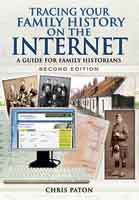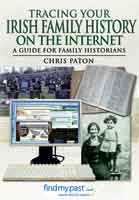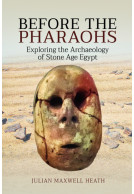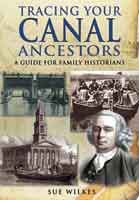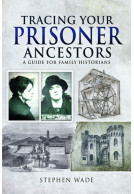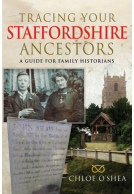Tracing Your Irish Ancestors Through Land Records (Paperback)
A Guide for Family Historians
Imprint: Pen & Sword Family History
Series: Tracing Your Ancestors
Pages: 176
Illustrations: 40 black and white illustrations
ISBN: 9781526780218
Published: 20th September 2021
Last Released: 2nd February 2023
(click here for international delivery rates)
Need a currency converter? Check XE.com for live rates
| Other formats available | Price |
|---|---|
| Tracing Your Irish Ancestors Through… ePub (21.2 MB) Add to Basket | £6.99 |
The history of Ireland is one that was long dominated by the question of land ownership, with complex and often distressing tales over the centuries of dispossession and colonisation, religious tensions, absentee landlordism, subsistence farming, and considerably more to sadden the heart. Yet with the destruction of much of Ireland's historic record during the Irish Civil War, and with the discriminatory Penal Laws in place in earlier times, it is often within land records that we can find evidence of our ancestors' existence, in some cases the only evidence, where the relevant vital records for an area may never have been kept or may not have survived.
In Tracing Your Irish Ancestors Through Land Records, genealogist and best-selling author Chris Paton explores how the surviving records can help with our ancestral research, but also tell the stories of the communities from within which our ancestors emerged. He explores the often controversial history of ownership of land across the island, the rights granted to those who held estates and the plights of the dispossessed, and identifies the various surviving records which can help to tease out the stories of many of Ireland's forgotten generations.
Along the way Chris Paton identifies the various ways to access the records, whether in Ireland's many archives, local and national, and increasingly through a variety of online platforms.
Rating: 5 out of 5 stars
NetGalley, Lina G
People seem to think that Irish genealogy is impossible, or that all of the records were burned during the civil war. While it's true that there are almost no census records available from before 1911, land records provide a valuable census substitute that can help you flesh out the bones of your Irish family tree. Chris Paton guides the reader through Irish land records (and the history behind them) in a way that is easy to understand and with clear advice on how to start practically using these records and building your Irish family tree.
This highly commendable volume comprises of some 160 pages and is presented in a laminated soft cover. Navigation is facilitated by both a detailed Table of Contents and by an index. The author’s words are illustrated through 40 monochrome images, which comprise photographs, facsimile documents and facsimile webpages. Meanwhile, for those who want to know more, a bibliography of further reading points the way forward.
Oxfordshire Family Historian, August 2022
Genealogist and writer Chris Paton, originally from County Antrim, Northern Ireland, who now lives in Scotland and runs the Scotland’s Greatest Story research service, has put together a fantastic book. With a look at the turbulent history of the Emerald Isle, as well as details of the availability of records, plus where and how to find them, this book is an absolute must for anyone who has, or thinks they may have, Irish ancestors. There are photographs, a detailed bibliography and an index.
Lucy London
Read the full review here
There is no doubt this author has the skills to unravel a subject that has caused problems for each and every one of us family historians, and I would suggest that the book is an essential working document for any true researcher on the Irish subject. The book comes closely after his previous Irish Family History on the Internet and each book is recommended on its own merit.
Ian White, Cumbria FHS - Cumbria Newsletter and Lancashire Journal
"Highly commendable volume."
Oxfordshire Family History Society Newsletter, Volume 36, No.1, April 2022
This is a useful reference work to keep to hand when first venturing into land records. However, even those who have a familiarity with these records will most certainly discover more.
Society of Geneaologists
Irish history was for a long time dominated by land ownership issues. There had been complex and harrowing tales of colonisation, dispossession, religious tensions, absentee landlords and subsistence farming. With so many records having been destroyed in the Irish Civil War, land records are often the only means of establishing ancestors’ existence. In some areas records may never have been kept or failed to survive for other reasons.
Bristol and Avon Family History Society
The author explores the controversial history of land ownership, the rights granted to those who held estates and the plights of the dispossessed. He identifies the records that do survive and where and how to access them through national and local archives and websites. Included are information on vital records, censuses, Valuation surveys, estate and manor records and probate records.
There is a broad history of Ireland, its boundaries and administration, and stories of the communities from which ancestors emerged. This is all accompanied by a timeline, a guide to place sources and histories, and a list of further reading.
Having read several of the author's other books and many of his magazine articles, as well as hearing him speak on several occasions I was expecting a comprehensive and well-researched book – and I was not disappointed. It's going to guide me through the next stages of my research in Ireland, and it could do the same for you!
Lost Cousins
Read the full review here
Rating: 5 out of 5 stars
GoodReads, Crystalrainbow
A valuable guide to those trying to put more flesh on the bones of their ancestors in Ireland. A complex book but well worth making the effort to read it alongside some of Chris Paton's other Irish family history research guides.
I have been putting off trying to find out more about my husband’s family as I have little knowledge of the history and records in the country. This book has helped immensely in filling in the gaps of my understanding of the history of Ireland and the sort of records I might expect to be able to find about where they lived. The book seeks to help researchers to add something more than dates and relationships to their Irish ancestry.
There is a good index in the book that quickly enables me to focus in on my area of interest – Tipperary. By no means a short cut to research but the book has given me so many more ideas of things to try, research avenues to pursue and I also have a list of websites to follow up in the hope of finding details of the family.
I am hopeful that this book will help me enrich the detail in my research and it certainly shed light on some hitherto unknown details of the Irish systems and history.
Read the full review here
It’s clear that this was a personal book for Chris, with lots of nice references to his own family and use of his ancestors for examples. Including chapters on repositories, Irish history and how land was divided up in different contexts were solid additions which will help both the non-Irish and Irish reader to understand why some records exist and others don’t.
Claire Bradley
The other chapters are broken down by record type (broadly: censuses, land valuation surveys, land tenancy & ownership) with clear, easily understood detail and are jam-packed with web links. I’ve certainly learned new things from it.
I consider this to be an essential book on your shelf for Irish genealogy research.
Read the full review here
It is often within land and property records that we can find evidence of our ancestors' existence, perhaps the only evidence. Therefore this book, which ranges more widely than the title suggests, is an essential read for anyone taking their Irish research seriously and wanting to progress it further when the basic records for research become unavailable.
WDYTYA magazine, issue 186, January 2022, p. 83
I bought the book and had immediate success. I wanted to know who currently owned my ancestor's land in Ireland, and how the land was divided between my ancestor and his brother when their father died. I wondered about that for years and didn't know how to go about getting this information. A link in the book led me to a site where I was able to order folios of land records for the family land, and map the land each man owned. I recommend the book because it provides more detailed information on the various land records and where to find them than other books I've read.
Annettee Kapple
Watch the full video review here
Rating: 5 out of 5 stars
NetGalley, Erinne Carey
Fantastic resource for anyone chasing their Irish family history! Highly recommend to all genealogist, new and old!
As featured in
Who Do You Think You Are
"In summary, another fine publication from the Chris Paton ‘stable’ and, while specialist in nature, one that succeeds in further demystifying Irish genealogical research."
Chris Broom Dip. Gen. QG, for Alde Valley Suffolk Family History Group
This is an excellent book; the author has a wealth of knowledge, which he shares with us. He tells us what is available and where to find it and he illustrates this with examples.
North of Ireland Family History Society
Quite a lot of family historians have Irish ancestors and tracing them can be a very taxing job, especially after the 1922 Civil War which saw the destruction of the Public Record Office.
East Yorkshire Family History Society
Try not to despair if you find your research project thwarted at nearly every turn. Chris Paton’s book will guide you towards various avenues which you can explore in your quest for answers. Instead of me trying to highlight the numerous websites which Chris has in his book I will let the author guide you through some of the highlights himself.
It will be a useful book to purchase and to have upon your family history research shelf.
I just recently found out I have family from Ireland so this book was the perfect jumping off point for me. I’m so excited to see what I can find out. There was much more than just reference links. I was fascinated by the history included. Wonderful, helpful book!
NetGalley, Joni Owens
"This is a must for anyone with Irish Ancestry."
Clwyd FHS
This is one of a large range of well over seventy family history books published by Pen and Sword.
Ian Phillpott, Editor - Leicestershire & Rutland Family History Society
The book starts with a handy timeline of Irish history 1529-2011. It then takes us on a detailed journey through all key aspects of Irish family history research, with a strong emphasis on available online resources.
The author gives us a broad overview of the resources available including archives, libraries, valuation services, property and land services, key websites and family history and local studies societies. Key to successful research is an understanding of the structure and geography of Ireland. The author covers this in detail, looking at Province-to-townland boundaries, Poor Law Unions and Civil Registration. He examines access to BMDs and the census. (It is sad to find that the census records of 1821-1891 are virtually completely lost The 1901 and 1911 have survived complete and the author gives us a detailed map of how to get the most from those). We are also guided through optimum use of the 1939 Register, street and trade directories and electoral records.
There are detailed and helpful sections on tithes, estate records and maps, freeholders, leases and rentals, Manor records, inheritance and probate, deeds, landowners and Land Commissions and the Land Registry. The author concludes with a comprehensive look at OS maps and memoirs, gazetteers and journals.
If you have Irish family roots, this book is an excellent resource and guide to help you to make the most of your researches on ancestors across the Irish Sea.
This book goes through the process of finding your family through land records. With so many records lost or damaged over the years you can come to a dead end quite quickly. This book does exactly what it claims. Easy to follow and refer back to when needed. Find all your resources in one place. And ideal guidance for genealogy and social history.
NetGalley, Heather Cracknell
This book should be an important source for those interested in pursuing their Irish ancestors. The information will make exploring people through land documents easier and will highlight the nuances of the Irish records that are unique to the country. Included at the end is a list of recommended further reading that is also helpful.
NetGalley, Sandra Eichelberger
Featured in article 'Irish Land Records'.
Family Tree
An Informative look and researching your Irish roots. Very detailed on using land records to fill in gaps from other missing records.
NetGalley, Carissa Miller
Featured in
Genealogical Society of Ireland newsletter - October 2021
Really good reference book. Lots of links to sites and explanations of how records work in Ireland.
NetGalley, Lou Davis
As someone with Irish roots and a keen interest in genealogy, I absolutely wanted to read this book. I have spent years doing genealogical research and a gap I have is from the Irish side of the family. While they immigrated to the US in 1900, I have been unable to find many records of them in Ireland. However, a large part of this is because much of the national registers were destroyed during the Irish Civil War and a fire that engulfed many of the records in 1922.
NetGalley, Samantha Garrity
Paton’s book is a great guide on not only the how and whys the records of Ireland were and are recorded and preserved the way they are but also how to find and navigate different types of records, like tithe, land, birth, etc. It is quite informative and Paton includes a lot of links and screenshots of the website they discuss.
This is a great guide on how to start or continue your journey with finding your Irish Ancestors. I can not wait to get started.
NetGalley, Sheila Treacy
Rating: 5 out of 5 stars
NetGalley, Jamie Lovett
What a wonderful, well-researched resource for anyone wanting to trace your Irish roots! Chris Paton’s Tracing Your Irish Ancestors Through Land Records is a wealth of information all in one place! A book I will return to again and again to help me on my journey to find my Irish ancestors!
About Chris Paton
Originally from Carrickfergus on the outskirts of Belfast, genealogist and writer Chris Paton is today based in Ayrshire, Scotland, where he runs the Scotland’s Greatest Story research service at www.scotlandsgreateststory.co.uk. As well as contributing to many of the UK’s best known family history magazines, he also writes for his own Scottish GENES news blog at www.scottishgenes.blogspot.com, and regularly gives talks to family history societies across the UK and worldwide. His previous Pen and Sword publications include Tracing Your Irish Ancestors Through Land Records, Tracing Your Irish Family History on the Internet (2nd edition), Tracing Scottish Ancestry Through Church and State Records, Tracing Your Scottish Family History on the Internet, and Sharing Your Family History Online.









